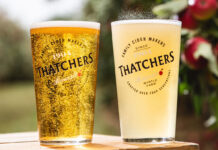Training has made progression more viable than ever
In days gone by a part-time job in hospitality was seen by many young people as a way to earn some spending money while studying for a career somewhere else.

And while the industry remains popular with students, hospitality is increasingly being seen as a viable career in itself.
It’s widely accepted that, in recent years, through Scottish Government legislation as well as tougher competition, the general standard of professionalism and customer service in the licensed trade has improved.
“The licensed trade has really evolved in Scotland in recent years and so have attitudes and perceptions towards the industry,” said Mike Cottam, WSET (Wine & Spirit Education Trust) tutor at Inverarity Morton.
“Fine dining restaurants aren’t the only place you’ll find polite, professional staff; bars aren’t full of student workers earning ‘drinking money’. It’s now something you can build a career in and so operators should combine bespoke in-house training with formal vocational qualifications, so we can continue to drive up standards and improve the reputation of the industry even further.”
The licensed trade has evolved, and so have perceptions of the industry.
For those setting out in the industry, it is now possible to plot career development through courses provided by their employers, external training firms or a combination of the two.
Right from the offset, there are training modules that can help recruits to master the basics.
“Like any other career you need to start with the basics and essentials, and as they develop they can become experts in different areas,” said Aileen McDonald of AMD Business Training and Development.
She said beginner training can cover subjects including basic customer service, as well as skills such as first aid, food safety and barista training.
“There is a wide range of specialised training as they progress their career,” said McDonald.
“For example, supervisory skills, whisky ambassador and wine training.”
Those looking to progress through the industry needn’t go it alone.
Stephanie Wade, director of the Tennent’s Training Academy, said funding is available for individuals looking to further their training.
“For those unable to secure funding for training through their employer, Individual Learning Accounts (ILAs) are available for those aged 16 or over and living in Scotland,” said Wade.
“You can apply for an ILA if you do not have a degree or above, are not undertaking any secondary, further or higher education, training through the Employability Fund or Modern Apprenticeship, or participating on the Community Jobs Scotland programme.
There is a range of training available as a person progresses their career.
“You must also have an income of £22,000 a year or less, or be on benefits to be eligible to get up to £200 towards the costs of learning or training.”
Pursuing external training courses is important, said Jamie Shields of Solid Liquids, because the courses and qualifications provided by dedicated firms “provide a learner exposure to a wider syllabus, thus ensuring greater potential for career progression”.
“In-house training is fantastic in learning about a particular venue or company, however this must be supplemented, more so the higher the learner goes, with external training,” said Shields.
“This allows the learner to develop beyond their current role or company.”
That isn’t to say that in-house training isn’t also important, however.
In fact, Cottam of Inverarity Morton said an ambitious person will take every training opportunity available.
“The keen staff member will take up any training opportunity, internal and external, that allows them to evaluate more,” said Cottam.
“‘What has helped me most, and how can I use it?’”
While qualifications and job skills are obviously essential for anyone looking to progress their career, product knowledge is another important area for anyone in a customer-facing role.
“For customers in the on-trade, the product is crucial,” said Wade, at Tennent’s Training Academy.
“The more knowledgeable and informed staff are on the products on offer, the greater benefit it has to the business.”
And Shields, of Solid Liquids, said well-trained and knowledgeable staff “are more confident, improve sales, and ultimately customer satisfaction”.
Training on the ‘perfect serve’ can also make a difference in terms of giving bar staff the tools to grow sales, according to Amy Burgess, trade communications manager at Coca-Cola European Partners (CCEP).
Burgess said staff can encourage customers to buy a second drink by “focusing on presentation, including serving drinks in their own branded glassware”.

























